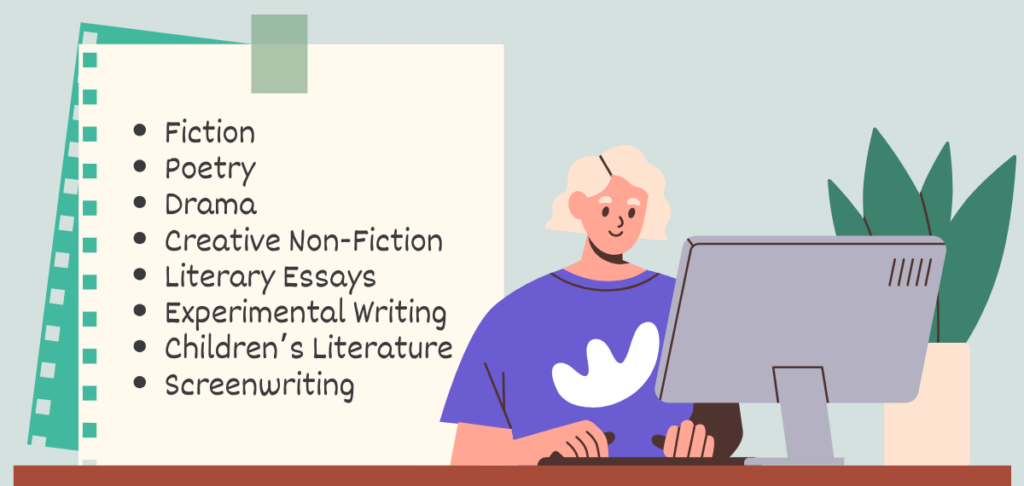Creative writing skills are invaluable assets that set freelance writers apart in the industry. These skills can be impactful in non-fiction areas such as legal writing.
One of the key ways in which creative writing skills can be highlighted is through the art of storytelling. By incorporating storytelling techniques into their work, freelance writers can transform dry, technical content into a captivating narrative.
Storytelling makes the content more engaging and establishes a connection with readers. Its use allows freelance writers to stand out and leave a lasting impact on their audience.
In this article, I define the art of creative writing, explain its structure and elements, and provide various examples and benefits to help you improve your material and make it stand out. Keep reading to learn how to develop your creative writing skills.
What Is Creative Writing?
Creative writing refers to the art of crafting original and imaginative written content. It encompasses many literary forms, including fiction, poetry, drama, and creative non-fiction.
For freelance writers, creative writing involves using language to evoke emotions, paint vivid descriptions, and engage readers on a deeper level. It goes beyond simply conveying information and strives to bring attention to an author’s message.
Creative writing skills can be applied to various genres and formats in freelance writing. These techniques can benefit narratives, persuasive arguments, and informational content through literary devices, such as metaphors, similes, imagery, and dialogue.
Moreover, creative writing encourages freelance writers to experiment with language and helps writers develop a distinctive and recognizable writing voice. This individuality can help freelance writers stand out in a saturated job market and attract clients who appreciate their unique approach.
What Are the Elements of Creative Writing?
The elements of creative writing encompass various aspects that contribute to a piece’s overall effectiveness and impact.
Plot & Structure
Plot refers to the sequence of events that unfold in a story, while structure refers to the organization and arrangement of those events. A well-crafted plot engages readers, creates tension, and drives the narrative forward. The structure provides a framework for the story, including elements such as exposition, rising action, climax, falling action, and resolution.
When applied to technical writing, creative plot and structure techniques can be used to help organize the information in a logical and coherent manner. For example, using a step-by-step narrative structure or dividing the content into chapters or sections can help readers follow the flow of information more easily and understand the material in a structured manner.
They also allow technical writers to provide context and real-world examples to support their explanations. By incorporating case studies, anecdotes, or hypothetical scenarios, writers can illustrate how the concepts apply in practical situations.
Character Development
Characters are the heart of a story. Effective character development involves creating believable characters with unique personalities, motivations, and conflicts. Developing characters readers can connect with and care about enhances the story’s emotional impact.
Character development in a technical piece might involve personal anecdotes or examples for further explanation of a concept.
Language & Tone
Language choices and tone greatly influence the mood of a reader’s experience. Creative writers use descriptive language to paint vivid images and evoke emotions in readers. The tone reflects the writer’s attitude or perspective toward the subject matter and can range from serious and formal to playful and humorous.
How words are used can help detail the examples and scenarios used in writing and provide a unique and more relatable experience for the reader.
What Are the Types or Forms of Creative Writing?
There are various types or forms of creative writing, each with its own unique characteristics that can be used to express an author’s message.
- Fiction: Fictional writing involves creating imaginative narratives, characters, and settings. It includes genres such as novels, short stories, flash fiction, and novellas.
- Poetry: Poetry is a form of writing that uses rhythm, imagery, and language to convey emotions and ideas. It can take various forms, such as sonnets, haiku, free verse, and spoken word poetry.
- Drama: Drama involves writing scripts for stage plays, film screenplays, or television script writing. It focuses on dialogue, characterization, and plot development within a dramatic structure.
- Creative Non-fiction: Creative non-fiction combines storytelling techniques with factual information. It includes genres such as memoirs, personal essays, travel writing, and literary journalism.
- Literary Essays: Literary essays explore and analyze literary works, themes, and ideas. They often incorporate personal reflections and interpretations alongside critical analysis.
- Experimental Writing: Experimental writing pushes the boundaries of traditional forms and conventions. It may involve unconventional structures, fragmented narratives, or unconventional language use.
- Children’s Literature: Children’s literature encompasses various genres, including picture books, middle-grade fiction, and young adult novels. It requires an understanding of age-appropriate language, themes, and storytelling techniques.
- Screenwriting: Screenwriting involves writing scripts specifically for film or television. It requires a strong understanding of visual storytelling, dialogue, and pacing.
Navigating Genres in Creative Freelance Writing
Navigating genres in creative freelance writing involves understanding the conventions, themes, and audience expectations of different genres. It requires studying and analyzing works within each genre to fully understand their unique characteristics.
Tailoring Style to Different Genres
Tailoring your writing style to different genres is crucial for maintaining authenticity and engaging readers. For example, writing a gripping mystery novel requires creating suspense, developing intricate plotlines, and constructing compelling characters.
On the other hand, crafting a heartfelt romance novel necessitates focusing on emotional connections, developing romantic tension, and evoking a sense of intimacy.
Challenges and Opportunities in Genre-Specific Writing
Challenges arise when delving into genre-specific writing. Each genre has its own expectations, making it essential for freelance writers to balance meeting those expectations and delivering fresh and original content. They must find new and innovative ways to approach familiar themes and storylines and create a unique voice within the genre.
What Are the Benefits of Creative Writing for Freelancers?
Creative writing offers several benefits for freelancers in their professional pursuits. Some key benefits include:
- Differentiation: Creative writing skills help freelancers to stand out from the competition. They bring a unique and engaging voice to their work.
- Versatility: Creative writing skills allow freelancers to adapt their writing style to suit different genres, industries, and client preferences. This adaptability enables freelancers to take on a broader range of projects.
- Engaging Content: By employing storytelling, descriptive language, and literary devices, freelancers can draw readers’ attention, evoke emotions, and leave a lasting impact.
- Enhanced Communication: Creative writing skills improve freelancers’ ability to communicate effectively and compellingly. They can convey complex ideas, legal concepts, or technical information in a clear and accessible manner.
- Problem-Solving: Freelancers often encounter project challenges, such as finding innovative solutions, developing unique angles, or overcoming writer’s block. Creative writing skills enable freelancers to creatively approach these challenges and find imaginative solutions.
- Personal Development: Engaging in creative writing allows freelancers to explore their own thoughts, emotions, and perspectives through writing, fostering self-awareness and self-discovery.
- Professional Development: Creative writing skills contribute to continuous professional development for freelancers. By honing their craft and expanding their repertoire, freelancers can increase their marketability, attract higher-paying clients, and open doors to new opportunities in the writing industry.
- Artistic Fulfillment: Freelancers can express their creativity, share their stories and ideas with the world, and derive a deep sense of personal fulfillment from their work.
What Are the Challenges in Creative Freelance Writing?
Creative freelance writing comes with its own set of challenges. Some common challenges faced by freelance writers in the creative field include:
- Finding Consistent Work: To secure consistent work, freelancers must actively market themselves, network, and constantly seek new opportunities.
- Managing Finances: Freelancers are responsible for managing their finances, which can be challenging. Income may fluctuate, making it necessary to budget and plan accordingly. Additionally, freelancers must handle invoicing, tax obligations, and expenses related to their business, which requires financial organization and discipline.
- Dealing with Rejection: Rejection is a common aspect of creative freelance writing. Clients may only sometimes choose your work or provide feedback requiring revisions or changes. It can be challenging to navigate criticism and rejection, but viewing them as opportunities for growth is essential.
- Meeting Client Expectations: Each client has unique project requirements and expectations. Freelancers must be able to understand and adapt to those expectations, delivering work that aligns with the client’s vision.
- Creative Blocks and Burnout: Creative blocks and burnout can hinder a freelancer’s productivity and creativity. Deadlines, pressure, and the constant need for fresh ideas can take a toll.
- Balancing Creativity with Client Demands: Finding the right balance between artistic expression and meeting client expectations can be a delicate process, requiring effective communication, negotiation, and compromise.
- Self-Motivation and Discipline: It can be challenging to stay focused and productive without the structure and accountability of a traditional work environment. Developing effective time management skills and maintaining a consistent work routine are essential.
- Continuous Learning and Skill Development: The writing industry constantly evolves, and freelance writers must stay updated with trends, techniques, and new technologies.
How to Develop Your Creative Writing Skills
Developing creative writing skills requires consistent practice and a willingness to try different techniques. Here are some steps you can take to develop your creative writing skills:
- Read Widely: Reading is fundamental to improving your writing skills. Read across various genres and styles to expose yourself to different writing techniques and narrative structures.
- Write Regularly: Make writing a habit by setting aside dedicated time for creative writing. Set goals for yourself, such as writing a certain number of words or spending a specific amount of time each day or week on writing projects.
- Experiment with Different Styles and Genres: Don’t limit yourself to a single style or genre. Try your hand at different types of writing, such as poetry, short stories, essays, or even screenplay writing.
- Practice Freewriting: Freewriting is a technique for writing continuously without worrying about grammar, structure, or coherence. Set a timer for a specific duration and let your thoughts flow onto the page.
- Seek Feedback: Share your work with trusted peers or mentors for constructive feedback. Feedback provides valuable insights into your strengths and areas for improvement.
- Study the Craft: Study by reading books on writing techniques, attending workshops or seminars, or taking online writing courses. Learn about narrative structure, character development, dialogue, and other storytelling elements.
- Embrace Creative Prompts: Engage in writing exercises and creative prompts to spark your imagination and push your creative boundaries. Prompts can be found in writing books, online platforms, or even generated randomly using AI.
- Edit and Revise: Writing involves multiple drafts and revisions. Embrace the editing and revision process to polish your work.
- Embrace Feedback: Be open to feedback and constructive criticism. Seek out writing communities, workshops, or writing groups where you can share your work and receive feedback from fellow writers.
Conclusion
Creative writing adds value to the freelance world. It allows freelancers to differentiate themselves, offer clients new perspectives, and showcase their ability to deliver fresh solutions.
By integrating creative writing skills into their pitches, freelancers can stand out in a competitive market and demonstrate their versatility. Plus, creative writing enhances communication, enabling freelancers to express their ideas effectively and build strong professional relationships.



